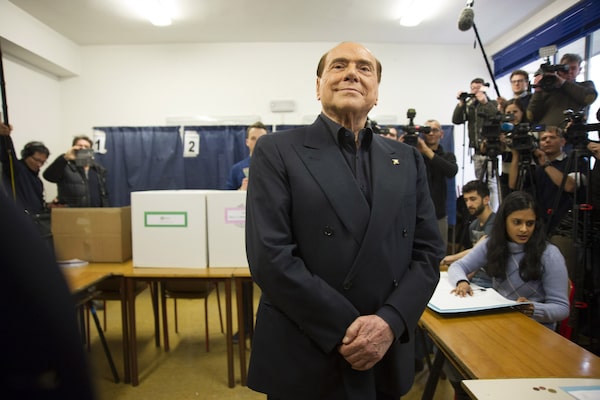
Silvio Berlusconi is pictured at a Milan polling station on March 4, 2018.Pier Marco Tacca
Silvio Berlusconi, the man who virtually invented postwar Italian populism, is sulking in his villa outside of Milan, ignored by the media. In Italy’s election, he was defeated by a purer set of populists who seem to have finally buried the tragicomic Berlusconi era.
Mr. Berlusconi’s centre-right Forza Italia (Go Italy) party, which began in 1993 as an anti-establishment force and went on to dominate politics in the euro zone’s third-largest economy for the better part of two decades, recorded its worst-ever showing in the March 4 election. Forza Italia scored just 14 per cent, down from 22 per cent in the 2013 election, putting it in fourth place in the party ranking. Mr. Berlusconi’s criminal conviction and infamous “bunga bunga” sex parties can’t take all the blame.
Worse for Mr. Berlusconi, the result deprived him of his coveted role as kingmaker. He had hoped that Forza Italia would emerge as the biggest party in the four-party centre-right alliance, giving him the power to dictate the makeup of the governing coalition and, indeed, the next prime minister. However, the nationalistic and xenophobic League (formerly Northern League) emerged on top of the centre-right alliance, with a remarkable 18 per cent of the vote, up from a mere 4 per cent five years ago.
Today, it is League Leader Matteo Salvini, not Mr. Belusconi, who controls the centre-right alliance, which took 37 per cent of the vote overall. Mr. Salvini, 45, is also a top contender to become Italy’s next prime minister. His main rival for the job is 31-year-old Luigi Di Maio, leader of the anti-establishment Five Star Movement. M5S, as it is known, took 32 per cent of the vote, making it the single most popular party (unlike Forza Italia and the League, M5S did not campaign as part of an alliance).
As Mr. Salvini and Mr. Di Maio compete for the right to cobble together the next governing coalition, a messy process that could take months, Mr. Berlusconi and his diminished band of followers must be wondering how he blew it so badly.
Ahead of the election, Mr. Berlusconi – wrinkle-free due to endless plastic surgery and somewhat frail after recent heart surgery – was brimming with confidence. At 81, he schmoozed his way through Sicily in November in the island’s regional election; his typically slick campaign performance helped to propel the centre-right to victory over the hard-charging M5S.
But his Sicilian performance was not to be replicated nationally, far from it. What went wrong for Il Cavaliere – the Knight – as he is called?
Italian economist Gianluigi Pelloni, former director of the Rimini Centre for Economic Analysis, says the March election was Italian populism’s breakthrough and M5S and the League simply did populism far better than Mr. Berlusconi. “Berlusconi was the original populist, but he no longer fulfils the requirements of a populist,” he said in an interview. “He’s no longer anti-establishment. His message was overwhelmed by M5S and the League.”
Mr. Berlusconi did 25 years ago what Donald Trump did in the 2016 U.S. election. He was an independent billionaire and political outsider – the anti-politician – whose ill-defined messages about political renewal, individual freedom, low taxes and social-democratic values captured the public’s imagination, putting him in Palazzo Chigi, the Italian White House, three times.
His politically incorrect personality and ownership of the highly ranked AC Milan soccer team made him a popular entertainment figure as well as politician. His penchant for parties with bikini-clad young women apparently made him a hero among Italian men of a certain age. He endured countless investigations and prosecutions, ranging from false accounting to sex with an underage prostitute, and survived all but one – a 2013 conviction for tax fraud, which prevents him from holding public office until 2019.
His latest campaign betrayed his populist roots. Certainly, he underestimated the populist appeal of M5S and the League by positioning himself, in effect, as the establishment, pro-Europe voice of stability among a sea of upstart parties infused with varying degrees of euroskepticism and xenophobia.
Alan Friedman, the American journalist who wrote a 2015 biography of Mr. Berlusconi, said that Mr. Berlusconi failed to realize that “Italy is in the throes of an ethno-populist revolution,” one that is anti-immigrant and wary of the European integration project and the common currency (Mr. Salvini calls the euro a “mistake” for Italy). Mr. Berlusconi’s pre-election trip to Brussels, where he met with European Commission President Jean-Claude Juncker, an unpopular figure in Italy, showed that he didn’t fully understand the appeal of the populist parties.
His campaign was also marred by puzzling statements that convinced some Italians that his wits were not entirely intact. At one point, he boasted that, as prime minister, he had ensured that Italians received 1,000-lira pensions, an amount worth less than a cup of coffee. He also boasted that he had “eliminated 411,000 taxes” (Italy might have 100 different taxes).
While Mr. Berlusconi seems finished as a political force, he will not be forgotten any time soon. Italians will no doubt flock to cinemas to see Loro (Them), Paolo Sorrentino’s new Berlusconi biopic, which is expected to debut in May at the Cannes Film Festival. The trailer features a man’s voice, asking: “What did you expect: to be the richest man in the country, become prime minister and be madly loved by everyone too? Yes, that’s exactly what I expected.”
Mr. Berlusconi expected election love one more time. Instead, he got disdain.
 Eric Reguly
Eric Reguly